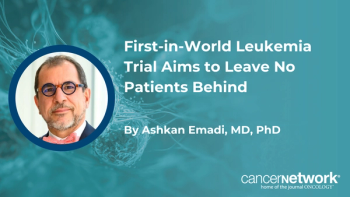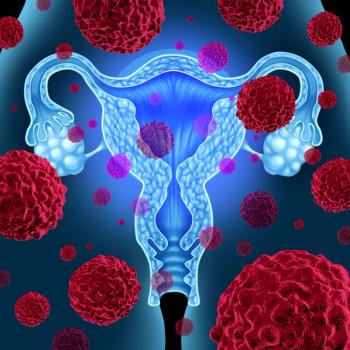
FDA Approves Amivantamab Combo in Advanced EGFR-mutated NSCLC

Findings from the MARIPOSA trial support the FDA approval of frontline amivantamab/lazertinib in advanced or metastatic EGFR-mutant NSCLC.
The FDA has approved amivantamab-vmjw (Rybrevant) in combination with lazertinib (Lazcluze) as frontline therapy for patients with locally advanced or metastatic EGFR-mutated non–small cell lung cancer (NSCLC), according to a press release from the developer, Johnson & Johnson.1
Specifically, the combination is indicated for use in patients with EGFR exon 19 deletions or exon 21 L858R substitution mutations as detected with an FDA-approved test.
Supporting findings for the approval came from the phase 3 MARIPOSA trial (NCT04487080), in which investigators evaluated amivantamab/lazertinib vs osimertinib (Tagrisso) monotherapy and lazertinib alone among patients with locally advanced or metastatic NSCLC harboring EGFR mutations.
Data from MARIPOSA showed a median progression-free survival (PFS) of 23.7 months (95% CI, 19.1-27.7) with amivantamab/lazertinib compared with 16.6 months (95% CI, 14.8-18.5) among patients who received osimertinib monotherapy (HR, 0.70; 95% CI, 0.58-0.85; P <.0001).2 Among patients with a response, the median duration of response (DOR) was 25.8 months (95% CI, 20.1-not estimable [NE]) vs 16.8 months (95% CI, 14.8-18.5) in each respective arm.
The safety profile of amivantamab plus lazertinib in the MARIPOSA trial was comparable with prior reports of each agent. Common any-grade adverse effects (AEs) in the amivantamab/lazertinib and osimertinib arms, respectively, included paronychia (68% vs 28%), infusion-related reactions (63% vs 0%), and rash (62% vs 31%).
“The unique combination of [amivantamab] and [lazertinib] demonstrated superior efficacy in the first-line treatment of certain patients with EGFR-mutated advanced NSCLC as shown with the MARIPOSA study. Patients will now have the option of a potential new first-line standard of care with significant clinical benefits over osimertinib,” study investigator Alexander Spira, MD, PhD, FACP, director of the Virginia Cancer Specialists Research Institute, said in the press release.1 “This first-line therapy uses a targeted approach aiming to achieve the best possible patient outcomes while reserving chemotherapy for later stages of treatment when resistance becomes more complex.”
In the MARIPOSA trial, patients were randomly assigned 2:2:1 to receive amivantamab plus lazertinib, osimertinib alone, or lazertinib monotherapy. Investigators administered amivantamab weekly at 1050 mg for the first 4 weeks of cycle 1. On cycle 2, patients received the same dose of amivantamab every 2 weeks in combination. Investigators also administered osimertinib at 80 mg once daily and lazertinib at 240 mg once daily.
The trial’s primary end point was PFS in the amivantamab/lazertinib arm vs the osimertinib arm based on blinded independent central review using RECIST v1.1 criteria. The key secondary end point was overall survival. Other secondary end points included objective responses, DOR, and safety.
Patients 18 years and older with previously untreated locally advanced or metastatic NSCLC harboring a common EGFR mutation were eligible for enrollment on the trial. Those with asymptomatic or stable brain metastases were able to enroll.
Developers
“This approval is a crucial development for patients with EGFR-mutated NSCLC, who have faced significant unmet needs for far too long. Having witnessed firsthand the remarkable evolution in lung cancer treatment, this profoundly important milestone brings a novel therapeutic approach to patients and their families. I'm thrilled that more patients can now experience the [PFS] benefits seen in the MARIPOSA study,” Jill Feldman, a lung cancer survivor and co-founder of the patient advocacy group EGFR Resisters, said in the press release.1
References
- RYBREVANT® (amivantamab-vmjw) plus LAZCLUZE™ (lazertinib) approved in the U.S. as a first-line chemotherapy-free treatment for patients with EGFR-mutated advanced lung cancer. News release. Johnson & Johnson. August 20, 2024. Accessed August 20, 2024. https://tinyurl.com/yxc8u8t4
- Cho BC, Lu S, Felip E, et al. Amivantamab plus lazertinib in previously untreated EGFR-mutated advanced NSCLC. N Engl J Med. Published June 26, 2024. doi:10.1056/NEJMoa2403614
- Johnson & Johnson submits supplemental biologics license application and new drug application to U.S. FDA seeking approval of RYBREVANT® (amivantamab-vmjw) plus lazertinib for the treatment of patients with EGFR-mutated non-small cell lung cancer (NSCLC). News release. Johnson & Johnson. December 21, 2023. Accessed August 20, 2024. http://tinyurl.com/kjpr73d5
Newsletter
Stay up to date on recent advances in the multidisciplinary approach to cancer.












































